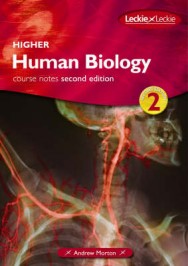
ABOUT THIS BOOK
PUBLISHER: Leckie & Leckie
FORMAT: Paperback
ISBN: 9781843724896
RRP: £11.99
PAGES: 112
PUBLICATION DATE:
November 29, 2007
BUY THIS BOOK
As an Amazon Associate and Bookshop.org affiliate we earn from qualifying purchases.
Higher Human Biology Course Notes
This second edition of the popular Higher Human Biology Course Notes is perfect for use as a classroom support to equip students with key information on the three course units in a bright new layout. All processes and experiments are explained clearly using a step-by-step approach, whilst diagrams and illustrations support understanding and help students to engage with the text. New topic-specific questions for students help them reinforce understanding and practice assessed skills.Contents Introduction Unit 1: Cell function and inheritance * The cell * Enzymes * Proteins * DNA, RNA and protein synthesis * Energy transfer * Anaerobic and aerobic respiration * Sources of energy * Cell membranes * Membrane transport * Immunity * Viruses * Inheritance * Mitosis * Meiosis * Monohybrid inheritance * Sex linkage * Polygenic inheritance * Mutations * Genetic screening and counselling Unit 2: The continuation of life * Reproduction – female * Reproduction – male * Infertility * Contraception * Prenatal development * Birth * Postnatal development * Transport systems * The circulatory system * The heart and the cardiac cycle * Blood pressure * Plasma, tissue fluid and lymph * Red blood cells * Gas transport * The absorption of nutrients * The liver * The kidneys * Regulating mechanisms * Hypothermia Unit 3: Behaviour, population and the environment * The brain * Neurones * Neurotransmitters * Memory * The development of behaviour * Infant attachment * Communication * Language * The effect of experience * Group behaviour * The population explosion * Feeding the human population * Water supply and the environment * Disease and the human population * The nitrogen cycle * The carbon cycle Tips for the exam Answers to quick questions Glossary









